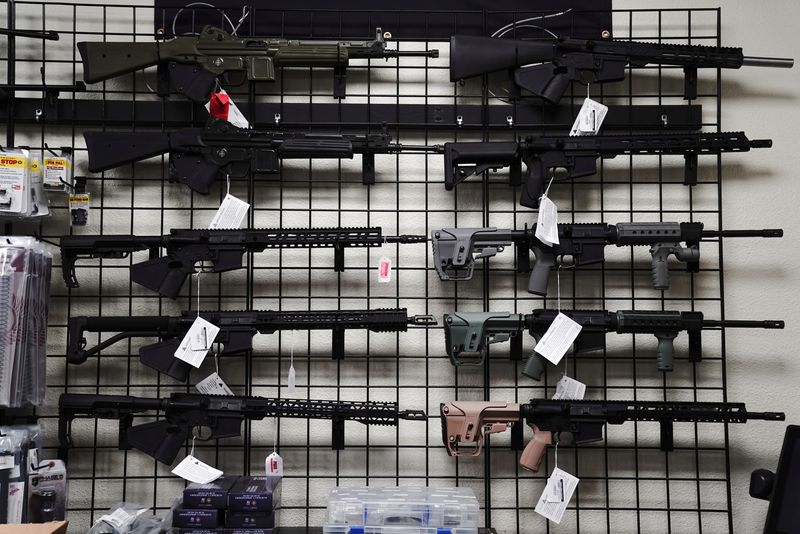Gun makers to ask US Supreme Court to bar Mexico’s lawsuit By Reuters
[ad_1]

© Reuters. FILE PHOTO: AR-15 style rifles are displayed for sale at Firearms Unknown, a gun store in Oceanside, California, U.S., April 12, 2021. REUTERS/Bing Guan
By Nate Raymond
BOSTON (Reuters) – U.S. gun manufacturers plan to ask the U.S. Supreme Court to hear their bid to escape Mexico’s $10 billion lawsuit seeking to hold them responsible for facilitating the trafficking of weapons to drug cartels across the U.S.-Mexico border.
The planned appeal was disclosed during a virtual court hearing on Friday by a lawyer for Smith & Wesson Brands after the Boston-based 1st U.S. Circuit Court of Appeals last month overturned a judge’s decision dismissing the case.
Mexico alleges in the lawsuit, filed in 2021, that the companies undermined its strict gun laws by designing, marketing and distributing military-style assault weapons in ways they knew would arm drug cartels, fueling murders, extortions and kidnappings in the country.
Mexico says over 500,000 guns are trafficked annually from the U.S. into Mexico, of which more than 68% are made by the eight companies it sued, which also include Sturm, Ruger & Co, Beretta USA, Barrett Firearms Manufacturing, Colt’s Manufacturing Co and Glock Inc.
Mexico said the smuggling has contributed to high rates of gun-related deaths, declining investment and economic activity and a need for it to spend more on law enforcement and public safety.
The companies deny wrongdoing.
Andrew Lelling, Smith & Wesson’s lawyer, said at Friday’s hearing there was a “reasonably good chance” the Supreme Court would agree to hear its appeal, and he asked U.S. District Judge Dennis Saylor to put the case on hold until the justices act on the petition.
He said the appeal would focus on whether Mexico’s claims are barred by a federal law, the Protection of Lawful Commerce in Arms Act (PLCAA), which gives gun manufacturers broad protection from lawsuits over the misuse of their products.
“This case involves a statute that is specifically designed to allow this specific set of defendants to avoid litigation costs if the case at issue falls within ambit of statute,” he said. “That very question is still the one at issue.”
The 1st Circuit ruled on Jan. 22 that while PLCAA can be applied to lawsuits by foreign governments, Mexico’s lawsuit “plausibly alleges a type of claim that is statutorily exempt from the PLCAA’s general prohibition.”
The court said that was because the law was only designed to protect lawful firearms-related commerce, yet Mexico had accused the companies of aiding and abetting illegal gun sales by facilitating the trafficking of firearms into the country.
Saylor on Friday said he had “some reservations” about putting the case fully on hold pending an appeal to the Supreme Court. He made no ruling, though, and said he would decide what to do at a March 12 hearing.
Mexico’s U.S. lawyer, Steve Shadowen, said it was “eager to get started on merits of the case just as soon as we properly can.”
[ad_2]
Source link

© Reuters. FILE PHOTO: AR-15 style rifles are displayed for sale at Firearms Unknown, a gun store in Oceanside, California, U.S., April 12, 2021. REUTERS/Bing Guan
By Nate Raymond
BOSTON (Reuters) – U.S. gun manufacturers plan to ask the U.S. Supreme Court to hear their bid to escape Mexico’s $10 billion lawsuit seeking to hold them responsible for facilitating the trafficking of weapons to drug cartels across the U.S.-Mexico border.
The planned appeal was disclosed during a virtual court hearing on Friday by a lawyer for Smith & Wesson Brands after the Boston-based 1st U.S. Circuit Court of Appeals last month overturned a judge’s decision dismissing the case.
Mexico alleges in the lawsuit, filed in 2021, that the companies undermined its strict gun laws by designing, marketing and distributing military-style assault weapons in ways they knew would arm drug cartels, fueling murders, extortions and kidnappings in the country.
Mexico says over 500,000 guns are trafficked annually from the U.S. into Mexico, of which more than 68% are made by the eight companies it sued, which also include Sturm, Ruger & Co, Beretta USA, Barrett Firearms Manufacturing, Colt’s Manufacturing Co and Glock Inc.
Mexico said the smuggling has contributed to high rates of gun-related deaths, declining investment and economic activity and a need for it to spend more on law enforcement and public safety.
The companies deny wrongdoing.
Andrew Lelling, Smith & Wesson’s lawyer, said at Friday’s hearing there was a “reasonably good chance” the Supreme Court would agree to hear its appeal, and he asked U.S. District Judge Dennis Saylor to put the case on hold until the justices act on the petition.
He said the appeal would focus on whether Mexico’s claims are barred by a federal law, the Protection of Lawful Commerce in Arms Act (PLCAA), which gives gun manufacturers broad protection from lawsuits over the misuse of their products.
“This case involves a statute that is specifically designed to allow this specific set of defendants to avoid litigation costs if the case at issue falls within ambit of statute,” he said. “That very question is still the one at issue.”
The 1st Circuit ruled on Jan. 22 that while PLCAA can be applied to lawsuits by foreign governments, Mexico’s lawsuit “plausibly alleges a type of claim that is statutorily exempt from the PLCAA’s general prohibition.”
The court said that was because the law was only designed to protect lawful firearms-related commerce, yet Mexico had accused the companies of aiding and abetting illegal gun sales by facilitating the trafficking of firearms into the country.
Saylor on Friday said he had “some reservations” about putting the case fully on hold pending an appeal to the Supreme Court. He made no ruling, though, and said he would decide what to do at a March 12 hearing.
Mexico’s U.S. lawyer, Steve Shadowen, said it was “eager to get started on merits of the case just as soon as we properly can.”